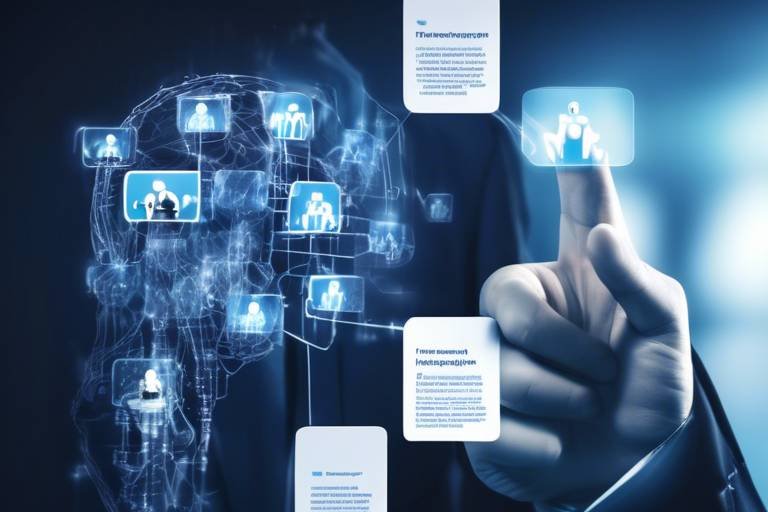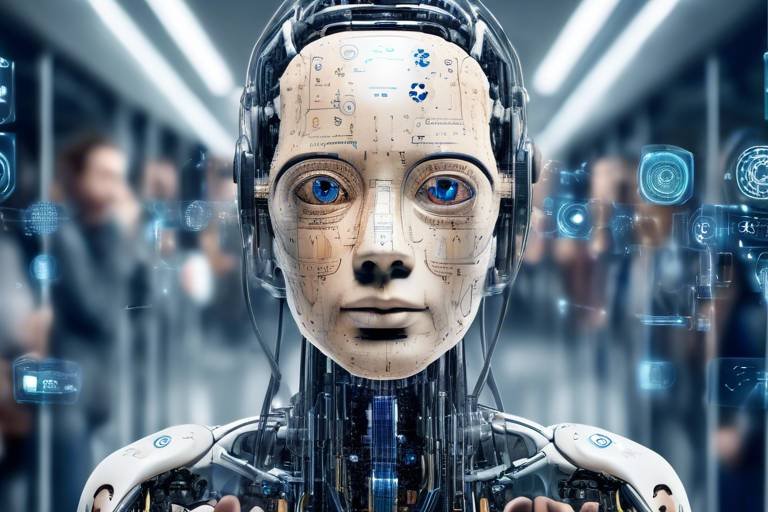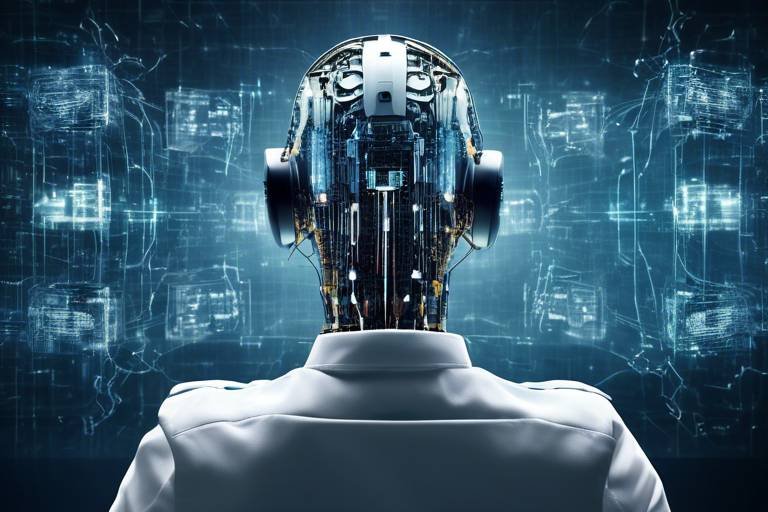Unlocking the Potential of AI in Team Management
In today's fast-paced business landscape, artificial intelligence (AI) is not just a buzzword; it's a transformative force reshaping how teams operate. Imagine a world where your team can communicate seamlessly, make informed decisions in real-time, and enhance productivity without the usual stress. That’s the promise of AI in team management. By integrating AI tools, organizations can streamline their processes, ultimately creating a more efficient and harmonious work environment.
AI isn't merely about replacing human effort; it's about augmenting it. Think of AI as a reliable co-pilot, guiding teams through the complexities of project management. With its capability to analyze vast amounts of data and provide actionable insights, AI empowers managers and team members alike to focus on what truly matters—achieving goals together. This article delves into how AI can enhance team management by improving communication, decision-making, and productivity, leading to a more cohesive work environment.
Before diving into the benefits, let’s clarify what AI means in the context of team management. At its core, AI refers to computer systems that can perform tasks that typically require human intelligence. This includes things like learning from experience, understanding natural language, and recognizing patterns. In team management, AI tools can analyze team dynamics, track progress, and even predict potential challenges before they arise.
Imagine your team is working on a project with tight deadlines. Traditional management practices might rely on periodic check-ins and status updates, which can often lead to miscommunication and delays. However, with AI, you can have real-time data at your fingertips, allowing for swift adjustments and informed decision-making. It’s like having a crystal ball that not only shows you the present but also helps you forecast the future.
The integration of AI into team management comes with a multitude of advantages. From enhanced productivity to improved decision-making, the benefits are substantial. Here’s a closer look:
- Enhanced Productivity: AI can automate repetitive tasks, freeing up team members to focus on more strategic initiatives.
- Improved Decision-Making: With data-driven insights, managers can make informed choices that align with the team’s goals.
- Better Communication: AI tools facilitate seamless communication, ensuring everyone is on the same page.
Communication is the lifeblood of any successful team. AI tools can streamline this process by providing real-time updates and automating responses. Imagine a scenario where team members can get instant answers to their queries without waiting for a manager to become available. This not only speeds up the workflow but also ensures that everyone has access to the information they need, when they need it.
Implementing AI-driven chatbots can revolutionize the support system within teams. These virtual assistants are available 24/7, providing instant answers to common queries. This reduces response times significantly, allowing managers to concentrate on more strategic tasks instead of getting bogged down in routine questions. It's like having a personal assistant for every team member, ensuring that help is always just a message away.
Collaboration is key to a team's success, and AI can enhance this by analyzing interactions and suggesting optimal ways to work together. Picture a tool that not only tracks who’s working on what but also offers suggestions on how to improve teamwork based on past interactions. This fosters a more cooperative environment where everyone feels valued and engaged.
In the age of information, data is king. AI enables teams to leverage data analytics for informed decision-making. By identifying trends and forecasting outcomes, managers can allocate resources more effectively and strategize better. It's akin to having a compass that guides you through the fog of uncertainty, making it much easier to navigate complex projects.
Despite its numerous benefits, integrating AI into team management is not without challenges. Issues such as resistance to change, data privacy concerns, and the need for proper training can hinder the adoption process. However, these challenges can be addressed with the right strategies.
One of the biggest hurdles is often the fear of the unknown. Team members might be apprehensive about how AI will affect their roles. Addressing these concerns through clear communication about the benefits of AI integration is crucial. When team members understand how AI can enhance their work rather than replace it, acceptance becomes much easier.
As with any technology, data privacy is a significant concern. Implementing strict data privacy measures is essential when using AI tools. This ensures that sensitive information is protected and maintains trust among team members. After all, trust is the foundation of any successful team.
Looking ahead, the role of AI in team management is expected to grow exponentially. With advancements in technology, we will see more sophisticated tools that will further enhance collaboration and productivity. The future is bright for teams willing to embrace AI, as it promises to unlock new levels of efficiency and effectiveness.
Q: How can AI improve team communication?
A: AI tools can provide real-time updates, automate routine responses, and facilitate collaboration, ensuring team members stay informed and engaged.
Q: What are the data privacy concerns with AI?
A: Data privacy concerns revolve around the protection of sensitive information. Implementing strict measures is crucial to maintain trust within the team.
Q: Will AI replace human jobs in team management?
A: No, AI is designed to augment human capabilities, not replace them. It helps teams work more efficiently by automating repetitive tasks.

Understanding AI in Team Management
Artificial Intelligence (AI) has become a buzzword in various industries, but its application in team management is particularly transformative. Imagine a world where mundane tasks are automated, decisions are backed by data, and communication flows effortlessly. Sounds like a dream, right? Well, that dream is closer to reality than you might think! In essence, AI refers to the simulation of human intelligence processes by machines, especially computer systems. This includes learning, reasoning, and self-correction. When we talk about AI in the context of team management, we're looking at how these technologies can enhance the way teams function and interact.
Traditionally, team management has relied heavily on human intuition and experience. Managers would often make decisions based on gut feelings or previous experiences, which could lead to inconsistent results. However, with AI, we can shift towards a more data-driven approach. AI tools can analyze vast amounts of data in real-time, providing insights that were previously unimaginable. For instance, AI can identify patterns in team performance, predict project outcomes, and even suggest the best strategies for achieving goals. This not only enhances efficiency but also reduces the risk of human error.
Furthermore, AI's relevance in team management extends beyond just decision-making. It also plays a crucial role in improving communication and collaboration among team members. With AI-driven tools, teams can receive instant updates, automate repetitive tasks, and facilitate seamless collaboration. Picture this: instead of spending hours in meetings or sifting through endless emails, team members can focus on what really matters—getting the job done! This shift not only boosts productivity but also fosters a more harmonious work environment.
To illustrate the impact of AI on team management, consider the following table that summarizes its capabilities:
| AI Capability | Impact on Team Management |
|---|---|
| Data Analysis | Informed decision-making through real-time insights |
| Automation | Reduction of repetitive tasks, allowing focus on strategic initiatives |
| Communication Tools | Enhanced collaboration and instant updates among team members |
| Predictive Analytics | Forecasting project outcomes and resource allocation |
In summary, understanding AI in team management is about recognizing its potential to revolutionize how teams operate. By integrating AI technologies, organizations can not only streamline their processes but also create a more engaged and productive workforce. As we delve deeper into the benefits of AI integration, it becomes clear that the future of team management is not just about managing people; it’s about harnessing the power of technology to create a more efficient and harmonious work environment.
- What is AI in team management? AI in team management refers to the use of artificial intelligence technologies to enhance communication, decision-making, and productivity within teams.
- How does AI improve communication in teams? AI improves communication by providing real-time updates, automating responses, and facilitating collaboration through advanced tools.
- What are the challenges of implementing AI in team management? Challenges include resistance to change, data privacy concerns, and the need for proper training to ensure effective use of AI tools.
- What is the future of AI in team management? The future of AI in team management looks promising, with advancements leading to more sophisticated tools that enhance collaboration and productivity.

Benefits of AI Integration
The integration of artificial intelligence (AI) into team management is not just a trend; it's a transformative shift that can redefine how teams operate. Imagine a workplace where mundane tasks are automated, allowing team members to focus on what truly matters—creativity, strategy, and collaboration. With AI, this dream becomes a reality. The benefits of AI integration are numerous, and they extend far beyond mere efficiency. Let's delve into some of the most impactful advantages.
One of the most significant benefits of AI in team management is enhanced productivity. By automating repetitive tasks, AI frees up valuable time for team members to engage in more strategic activities. For instance, AI can handle scheduling, data entry, and even preliminary data analysis, which means that employees can devote their efforts to high-value projects. This shift not only boosts productivity but also enhances job satisfaction, as team members feel less bogged down by tedious tasks.
Moreover, AI fosters improved decision-making. With access to vast amounts of data and advanced analytics, AI tools help managers make informed choices based on real-time insights. Imagine being able to predict project outcomes or identify potential risks before they become issues. AI can analyze patterns in team performance, resource allocation, and market trends, providing managers with the information they need to steer their teams in the right direction. This data-driven approach minimizes guesswork and maximizes effectiveness.
Another key advantage is the enhancement of communication among team members. AI tools can streamline communication channels by providing real-time updates and automating responses to common queries. This ensures that everyone is on the same page and reduces the potential for miscommunication. For example, AI-driven platforms can summarize meeting notes and distribute them to all team members, ensuring that critical information is easily accessible. Additionally, AI can analyze communication patterns and suggest improvements, fostering a more collaborative environment.
To illustrate the impact of AI on team management, consider the following table that summarizes the benefits:
| Benefit | Description |
|---|---|
| Enhanced Productivity | Automation of repetitive tasks allowing focus on strategic activities. |
| Improved Decision-Making | Data-driven insights for informed choices and risk management. |
| Better Communication | Streamlined channels and real-time updates to reduce miscommunication. |
Additionally, AI can facilitate personalized experiences for team members. By analyzing individual work habits and preferences, AI can suggest tailored strategies for productivity and collaboration. For instance, if a team member excels in visual presentations, AI can recommend tools and resources that cater to their strengths, enhancing overall team performance. This level of personalization helps in building a more engaged and motivated workforce.
Lastly, AI integration leads to a more cohesive work environment. By breaking down silos and fostering collaboration, AI encourages a sense of unity among team members. When everyone has access to the same information and tools, it creates a culture of transparency and trust. This is essential for building strong relationships within teams, ultimately leading to better outcomes and a more harmonious workplace.
In summary, the benefits of AI integration in team management are vast and varied. From enhanced productivity and improved decision-making to better communication and personalized experiences, AI is revolutionizing how teams operate. As we continue to embrace these technologies, the potential for a more efficient and harmonious work environment becomes increasingly attainable.

Improving Communication
In today's fast-paced work environment, effective communication is the lifeblood of any successful team. Imagine trying to row a boat with a group of people who are all paddling in different directions—chaotic, right? This is often what happens in teams that lack clear communication. Enter AI tools, which can revolutionize how team members interact, ensuring everyone is synchronized and working towards the same goals. By providing real-time updates, automating responses, and facilitating collaboration, AI can help create a seamless communication flow.
One of the standout features of AI in team management is its ability to deliver instant updates. Gone are the days when team members would have to wait for scheduled meetings to get the latest information. With AI-driven tools, team members can receive notifications about project changes, deadlines, and even feedback instantly. This immediacy not only keeps everyone informed but also reduces the chances of miscommunication and errors that can arise from outdated information.
Moreover, AI can automate routine communications, such as reminders or status updates. For instance, instead of a manager sending out daily emails to check in on project progress, an AI system can automatically gather updates from team members and compile them into a concise report. This not only saves time but also allows managers to focus on more strategic tasks rather than getting bogged down in the minutiae of daily communications.
One of the most exciting applications of AI in improving team communication is the use of chatbots. Picture this: a team member has a question about a project or needs clarification on a task. Instead of waiting for a colleague to become available, they can simply ask a chatbot. These AI-driven assistants are available 24/7 and can provide instant support for a myriad of queries. By significantly reducing response times, chatbots allow team members to get the information they need without disrupting their workflow. Plus, this frees up managers to concentrate on the bigger picture rather than answering repetitive questions.
AI doesn't just stop at communication; it also enhances collaboration tools. Imagine a tool that can analyze how your team interacts and suggest the best ways to work together. AI can evaluate past interactions and identify patterns, helping to optimize team dynamics. For example, if the data shows that certain team members collaborate more effectively when they use specific tools or methods, AI can recommend these approaches for future projects. This tailored support fosters a more cooperative environment, allowing teams to harness their collective strengths.
In conclusion, improving communication through AI is not just about adopting new technologies; it's about transforming the way teams operate. By leveraging AI tools, teams can enhance their communication, leading to better collaboration and ultimately, improved productivity. As we embrace these advancements, the potential for creating a more cohesive work environment becomes not just a possibility, but a reality.
- What are AI tools? AI tools are software applications that utilize artificial intelligence to perform tasks that typically require human intelligence, such as understanding natural language, recognizing patterns, and making decisions.
- How can chatbots improve team communication? Chatbots can provide instant answers to team members' queries, reducing wait times for information and allowing for uninterrupted workflow.
- What are the benefits of AI-enhanced collaboration tools? These tools can analyze team interactions and suggest optimal collaboration methods, fostering a more effective and cooperative work environment.

Chatbots for Instant Support
When it comes to enhancing team management, one of the most revolutionary tools at our disposal is the chatbot. Imagine having a virtual assistant that never sleeps, always ready to provide support and answers at a moment's notice. That's what chatbots bring to the table. They are designed to handle routine inquiries and tasks, freeing up valuable time for managers and team members alike. This means that instead of getting bogged down by repetitive questions, teams can focus on what truly matters: driving projects forward and fostering creativity.
Chatbots can be integrated into various communication platforms, such as Slack, Microsoft Teams, or even company websites. Their ability to provide instant support is a game-changer. For instance, if a team member has a question about project deadlines or needs access to specific documents, they can simply ask the chatbot. The bot can quickly pull up relevant information, saving time and reducing frustration. This is especially helpful in fast-paced environments where every second counts.
Moreover, chatbots can learn from interactions over time, becoming more adept at understanding the specific needs and preferences of the team. This adaptive learning means that as the team grows and evolves, the chatbot can evolve with it, continually enhancing its support capabilities. Here are some key benefits of using chatbots for instant support:
- 24/7 Availability: Unlike human counterparts, chatbots are always available, ensuring that team members can get answers to their questions at any time.
- Quick Response Times: With the ability to process requests almost instantaneously, chatbots can significantly reduce wait times for team members.
- Consistency in Information: Chatbots provide uniform responses, ensuring that every team member receives the same information, which helps in maintaining clarity.
- Data Collection: They can gather data on common questions and issues, providing valuable insights that can help managers improve processes.
In summary, implementing chatbots for instant support is not just about keeping pace with technology; it's about creating a more efficient and harmonious work environment. By streamlining communication and providing quick access to information, chatbots empower team members to be more productive and engaged. As we continue to embrace AI in team management, the role of chatbots will undoubtedly expand, making them an essential component of modern workplace dynamics.
Q1: How do chatbots improve team efficiency?
A1: Chatbots improve team efficiency by providing instant answers to common queries, allowing team members to focus on more complex tasks and reducing the time spent waiting for responses.
Q2: Can chatbots be customized for specific team needs?
A2: Yes, chatbots can be customized to cater to specific team needs, including the ability to answer unique questions and integrate with other tools used by the team.
Q3: What happens if a chatbot cannot answer a question?
A3: If a chatbot is unable to answer a question, it can escalate the query to a human team member, ensuring that all inquiries are addressed appropriately.
Q4: Are chatbots secure for handling sensitive information?
A4: While many chatbots are designed with security in mind, it's crucial for organizations to implement strict data privacy measures to protect sensitive information.

AI-Enhanced Collaboration Tools
In today’s fast-paced work environment, collaboration is more crucial than ever. Teams are often spread across different locations, and the need for seamless communication and cooperation can be challenging. This is where come into play, revolutionizing how we interact and work together. These tools leverage artificial intelligence to analyze team dynamics and suggest optimal ways for team members to collaborate effectively.
Imagine having a virtual assistant that understands your team's workflow, preferences, and even the nuances of your communication styles. AI tools can assess past interactions, identify patterns, and recommend strategies tailored to your team's unique needs. For instance, if a team tends to struggle with project deadlines, an AI tool could analyze their previous projects and suggest a more effective timeline based on historical data. This not only boosts productivity but also reduces the stress associated with miscommunication and missed deadlines.
Furthermore, AI can facilitate real-time feedback among team members. By utilizing tools that monitor ongoing projects, team members can receive instant notifications about changes, updates, or even potential issues. This immediate access to information ensures that everyone remains on the same page, fostering a more cohesive work environment. Imagine a scenario where a team member updates a document, and within seconds, all relevant stakeholders are notified, allowing them to provide input or make decisions swiftly. This level of responsiveness is a game-changer in team management.
To illustrate the impact of AI-enhanced collaboration tools, consider the following table that highlights key features and benefits:
| Feature | Benefit |
|---|---|
| Real-time Updates | Ensures all team members are informed of changes instantly, reducing miscommunication. |
| Task Automation | Automates routine tasks, allowing team members to focus on higher-value activities. |
| Data Analytics | Provides insights into team performance and project progress, enabling better decision-making. |
| Personalized Recommendations | Suggests optimal collaboration methods based on team dynamics and past interactions. |
In conclusion, AI-enhanced collaboration tools are not just a trend; they are becoming essential for modern team management. By harnessing the power of AI, teams can work smarter, not harder, leading to improved outcomes and a more harmonious work environment. As we continue to embrace technology, these tools will undoubtedly play a pivotal role in shaping the future of teamwork.
- What are AI-enhanced collaboration tools? These are software solutions that use artificial intelligence to improve team communication, streamline workflows, and enhance overall collaboration.
- How can AI tools improve team productivity? By providing real-time updates, automating repetitive tasks, and offering data-driven insights, AI tools help teams work more efficiently and effectively.
- Are there any risks associated with using AI in team management? Yes, challenges such as data privacy concerns and resistance to change can arise, which need to be addressed to ensure successful implementation.

Data-Driven Decision Making
In today's fast-paced business environment, the ability to make informed decisions quickly is crucial for success. This is where artificial intelligence (AI) comes into play, transforming the way teams approach decision-making. By harnessing the power of data analytics, AI enables teams to sift through vast amounts of information, uncovering insights that would be nearly impossible to discern manually. Imagine having a personal assistant who not only organizes your data but also highlights trends and forecasts outcomes—this is the essence of AI in decision-making.
One of the most significant advantages of using AI for decision-making is its capability to analyze historical data and identify patterns. For instance, AI can help managers understand past project performances, team dynamics, and resource allocation, leading to more informed choices in the future. By utilizing predictive analytics, teams can anticipate challenges before they arise, allowing for proactive rather than reactive management. This shift from gut-feeling decisions to data-driven choices can significantly enhance overall productivity and effectiveness.
Moreover, AI tools can provide real-time insights that help teams make decisions on the fly. Imagine a scenario where a project is falling behind schedule. With AI analytics at their disposal, managers can quickly identify the bottlenecks and reallocate resources accordingly. This agility not only saves time but also enhances team morale, as everyone feels more involved and informed about the project's status. In essence, data-driven decision-making fosters a culture of transparency and collaboration, where every team member can contribute to the solution.
However, it’s essential to remember that while AI can provide valuable insights, it should not replace human intuition and experience. Instead, think of AI as a powerful tool that complements human judgment. The best outcomes occur when teams leverage AI's analytical capabilities alongside their expertise, creating a synergy that drives success. To illustrate this point, consider the following table that highlights the differences between traditional decision-making and data-driven decision-making:
| Aspect | Traditional Decision-Making | Data-Driven Decision-Making |
|---|---|---|
| Data Usage | Limited data, often anecdotal | Extensive data analysis for insights |
| Speed | Slower, due to manual analysis | Rapid, with real-time analytics |
| Accuracy | Subjective, based on personal experience | Objective, based on data patterns |
| Collaboration | Often siloed decision-making | Encourages team involvement and input |
In conclusion, the integration of AI in data-driven decision-making not only enhances the quality of decisions made but also fosters a more collaborative and transparent work environment. As teams become more adept at utilizing these technologies, they will find themselves not just surviving in the competitive landscape, but thriving. The future of decision-making is here, and it’s powered by data!
- What is data-driven decision making?
Data-driven decision making involves using data analytics to inform business choices, enhancing accuracy and efficiency.
- How can AI improve decision making?
AI can analyze large datasets quickly, identify trends, and provide real-time insights, allowing teams to make informed decisions swiftly.
- Are there any risks associated with data-driven decision making?
Yes, risks include over-reliance on data, potential biases in data interpretation, and privacy concerns regarding data usage.
- Can AI replace human decision making?
No, AI should complement human judgment, providing insights that enhance decision-making rather than replacing it.

Challenges of AI Implementation
Integrating artificial intelligence into team management isn't just a walk in the park; it comes with its own set of challenges that organizations need to navigate carefully. One of the most significant hurdles is the resistance to change. Many team members may feel uneasy about adopting new technologies, fearing that AI could replace their roles or disrupt established workflows. This apprehension can lead to pushback, making it essential for management to address these concerns head-on. By communicating the benefits of AI—such as enhanced productivity and improved decision-making—leaders can help to alleviate fears and foster a more accepting environment.
Another critical challenge revolves around data privacy concerns. As teams increasingly rely on AI tools to process sensitive information, the risk of data breaches or misuse becomes a pressing issue. Organizations must implement robust security measures to protect their data. This includes using encryption, access controls, and regular audits to ensure compliance with privacy regulations. Maintaining trust among team members is paramount; if they feel their information is secure, they are more likely to embrace AI technologies.
Moreover, the need for proper training cannot be overstated. Introducing AI tools without adequate training can lead to frustration and inefficiency. Team members must be equipped with the knowledge and skills to use these technologies effectively. This may involve conducting workshops, providing online tutorials, or even creating a mentorship program where tech-savvy employees can assist others. Investing in training not only enhances the team's capability but also boosts morale, as employees feel more competent and empowered in their roles.
In summary, while the integration of AI in team management offers numerous benefits, organizations must be prepared to face challenges such as resistance to change, data privacy issues, and the necessity for comprehensive training. By addressing these challenges proactively, companies can pave the way for a smoother transition to a more efficient, AI-enhanced work environment.
- What is AI in team management? - AI in team management refers to the use of artificial intelligence technologies to enhance various aspects of team dynamics, including communication, decision-making, and productivity.
- How can AI improve team communication? - AI can streamline communication by providing real-time updates, automating responses, and facilitating collaboration, ensuring that everyone is aligned.
- What are the risks associated with AI implementation? - Key risks include resistance to change, data privacy concerns, and the need for proper training to maximize the effectiveness of AI tools.
- How can organizations overcome resistance to AI? - By clearly communicating the benefits of AI and providing support and training, organizations can help alleviate fears and encourage acceptance among team members.

Overcoming Resistance to Change
Change can be a tough pill to swallow, especially in the workplace where routines are often deeply ingrained. When it comes to integrating artificial intelligence into team management, resistance is a common hurdle. Many team members may feel apprehensive about how AI might alter their roles or the dynamics of their work environment. So, how do we tackle this resistance head-on? The key lies in effective communication and education.
First off, it's crucial to communicate the benefits of AI clearly. Let’s face it—nobody likes the feeling of being left in the dark. By outlining how AI can streamline processes, reduce mundane tasks, and ultimately enhance productivity, you can paint a picture of a more efficient future. For instance, if team members understand that AI can take over repetitive tasks, they may feel more excited about the opportunity to focus on creative and strategic work instead.
Moreover, involving team members in the transition process can significantly reduce resistance. When people feel like they have a say in the change, they are more likely to embrace it. Consider forming a task force that includes representatives from various departments. This group can not only provide insights into the unique challenges faced by different teams but also act as champions of the AI initiative. When team members see their peers advocating for AI, it can create a ripple effect of acceptance.
Another effective strategy is to provide comprehensive training sessions. Many resist change simply because they feel unprepared to adapt. By offering workshops or online courses on how to use new AI tools, you’re not just alleviating fears but also empowering your team. It’s like teaching someone to ride a bike; once they understand how it works, they’ll feel more confident and less intimidated. This sense of preparedness can transform skepticism into enthusiasm.
Finally, it’s important to address any concerns about job security openly. Many fear that AI could replace their roles, leading to a sense of vulnerability. To combat this, emphasize that AI is designed to assist and augment human capabilities, not replace them. In fact, the integration of AI often creates new roles focused on managing and interpreting AI outputs, which can lead to exciting career advancements.
In summary, overcoming resistance to change requires a multifaceted approach that involves communication, involvement, training, and reassurance. By fostering an environment of openness and support, you can help your team navigate the transition to AI-enhanced management with confidence and enthusiasm.
- What are the main benefits of AI in team management?
AI improves productivity, enhances communication, and enables data-driven decision-making, leading to a more cohesive work environment. - How can I address concerns about job security?
It's important to communicate that AI is intended to assist and augment human roles rather than replace them. - What kind of training is necessary for AI tools?
Training should cover the basics of AI tools, their functionalities, and practical applications within the team's workflow.

Ensuring Data Privacy
In the digital age, where information flows like a river, ensuring data privacy has become a paramount concern, especially when integrating AI into team management. With AI tools processing vast amounts of data, it's essential to implement robust measures that safeguard sensitive information. Think of it as building a strong fortress around your team's valuable data—one that keeps intruders out while allowing your team to work efficiently within its walls.
First and foremost, organizations must establish clear data privacy policies. These guidelines should outline how data is collected, stored, and utilized. By being transparent about data usage, teams can foster trust among members, alleviating concerns about potential misuse. Involving employees in discussions about these policies can also enhance their understanding and acceptance of AI technologies.
Moreover, regular training sessions should be conducted to ensure that all team members are aware of the best practices regarding data handling. This training can cover topics such as:
- Recognizing phishing attempts
- Understanding the importance of strong passwords
- Knowing how to report suspicious activities
Additionally, it's critical to implement strict access controls. Not everyone in the organization needs access to all data. By adopting a need-to-know basis approach, teams can significantly reduce the risk of unauthorized access. This method involves categorizing data based on sensitivity and granting access only to those who require it for their roles.
Another essential aspect is utilizing advanced encryption methods to protect data both in transit and at rest. Encryption acts like a secret code that only authorized users can decipher, ensuring that even if data is intercepted, it remains unreadable to unauthorized individuals. This can be particularly important when dealing with client information, financial records, or proprietary business insights.
Lastly, organizations should regularly audit their data privacy practices. By conducting assessments and penetration testing, teams can identify vulnerabilities and address them proactively. This not only helps in maintaining compliance with data protection regulations but also reinforces the organization's commitment to safeguarding sensitive information.
In summary, while AI offers tremendous benefits for team management, ensuring data privacy is a critical responsibility that organizations must prioritize. By developing comprehensive policies, providing training, controlling access, employing encryption, and conducting regular audits, teams can create a secure environment where AI can thrive without compromising sensitive information.
- What are the main concerns regarding data privacy in AI? The primary concerns include unauthorized access to sensitive information, misuse of data, and compliance with regulations.
- How can organizations ensure their data is protected? Organizations can implement strict access controls, utilize encryption, and conduct regular training and audits.
- What role does employee training play in data privacy? Employee training is crucial as it raises awareness about data handling best practices and helps in identifying potential security threats.

The Future of AI in Team Management
As we gaze into the horizon of workplace dynamics, it's impossible to ignore the profound impact that artificial intelligence (AI) is poised to have on team management. The future is not just about integrating AI into existing frameworks; it's about reimagining how we collaborate, communicate, and achieve our goals. Imagine a workplace where decisions are not only faster but also backed by data-driven insights, where every team member feels empowered by technology, and where productivity soars to new heights. Sounds like a dream? Well, it's closer than you think!
The evolution of AI in team management is akin to adding a turbocharger to an engine—suddenly, everything operates more smoothly and efficiently. With the rapid advancements in AI technology, we are witnessing a shift towards more sophisticated tools designed to enhance collaboration and productivity. These tools will not only automate mundane tasks but also provide actionable insights that can guide teams toward success.
One of the most exciting prospects is the development of predictive analytics. Imagine being able to forecast project outcomes based on historical data and team performance trends. This capability will enable managers to allocate resources more effectively and anticipate challenges before they arise. It's like having a crystal ball that helps you navigate the complexities of team dynamics with ease.
Moreover, the integration of AI will lead to the creation of virtual team assistants that can help manage schedules, set reminders, and even suggest optimal collaboration times based on team members' availability. These assistants will act as the glue that holds teams together, ensuring that everyone is aligned and working towards common objectives.
However, while the future of AI in team management is bright, it does come with its own set of challenges. As teams become more reliant on AI-driven tools, the need for continuous training and adaptation will be paramount. Organizations will need to invest in upskilling their workforce to ensure that everyone can leverage these technologies effectively. It's not just about having the tools; it's about knowing how to use them to their fullest potential.
Furthermore, as AI becomes more embedded in our daily workflows, issues surrounding data privacy and ethical considerations will need to be addressed. Companies must prioritize transparency and establish robust policies to protect sensitive information while fostering a culture of trust among team members. After all, the success of AI integration relies heavily on the willingness of individuals to embrace it.
In conclusion, the future of AI in team management is not just a trend; it’s a transformative journey that will redefine how we work together. By embracing the potential of AI, organizations can unlock new levels of efficiency, creativity, and collaboration. So, are you ready to step into the future and harness the power of AI for your team? The possibilities are endless!
- What are the main benefits of using AI in team management? AI enhances productivity, improves decision-making, and facilitates better communication among team members.
- How can AI tools improve communication within teams? AI tools streamline communication by providing real-time updates, automating responses, and suggesting optimal collaboration methods.
- What challenges might arise from implementing AI in team management? Challenges include resistance to change, data privacy concerns, and the need for proper training.
- What does the future hold for AI in team management? The future includes more sophisticated AI tools that enhance collaboration, predictive analytics for informed decision-making, and the need for continuous training and adaptation.
Frequently Asked Questions
- What is the role of AI in team management?
AI plays a crucial role in team management by enhancing communication, improving decision-making, and boosting productivity. It transforms traditional management practices into data-driven approaches, allowing teams to operate more efficiently.
- How can AI improve communication within teams?
AI improves communication through tools like chatbots that provide instant support, real-time updates, and automated responses. These tools ensure that all team members stay informed and engaged, fostering a collaborative environment.
- What are the benefits of using AI for decision-making?
AI enables teams to leverage data analytics, which helps in identifying trends, forecasting outcomes, and making informed decisions. This data-driven approach enhances resource allocation and leads to better overall performance.
- What challenges might teams face when implementing AI?
Challenges include resistance to change, concerns about data privacy, and the need for proper training. Addressing these issues is vital for successful AI integration, ensuring that team members understand its benefits and how to use the tools effectively.
- How can teams overcome resistance to AI integration?
To overcome resistance, it's essential to communicate the benefits of AI clearly and involve team members in the implementation process. Providing training and support can also help alleviate concerns and foster acceptance.
- What measures should be taken to ensure data privacy when using AI?
Implementing strict data privacy measures is crucial. This includes using encryption, access controls, and regular audits to protect sensitive information and maintain trust among team members.
- What does the future hold for AI in team management?
The future of AI in team management looks promising, with advancements leading to more sophisticated tools that will further enhance collaboration and productivity. As technology evolves, AI will likely play an even larger role in shaping efficient work environments.



















